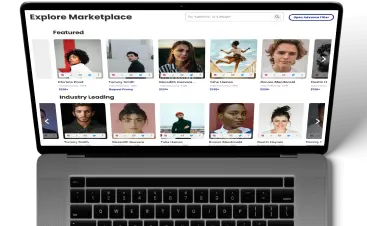Are you a marketer or business owner looking to grow and expand your reach? With the ever-shifting landscape of digital marketing, it’s easy to become overwhelmed by the numerous options out there.
If you’re considering enlisting either an affiliate marketing or influencer marketing program (two strategies with some similarities and plenty of variations), this blog post is for you. In this piece, we will delve deep into exactly what each form involves so that you can make an informed decision on which digital marketing strategy fits your needs best. Keep reading to gain insight into all the differences between affiliate advertising versus influencer promotion – from understanding how they work to articulating their pros and cons.
Overview of Affiliate Marketing
Affiliate marketing is a powerful tool for businesses to expand their reach and increase revenue. As a credible way to establish partnerships, affiliate marketing can help brands target new demographics, penetrate new markets, and ultimately scale their business. By collaborating with affiliate partners, companies can leverage their existing audiences to boost their conversion rates while minimizing marketing expenses significantly.
However, it’s important to note that not all partnerships are created equal. To ensure success, businesses must partner with affiliates who have a strong reputation and alignment with their brand values. Ultimately, affiliate marketing can be a valuable asset for businesses looking to grow their customer base and increase revenue in a cost-effective way.
a. Definition Of Affiliate Marketing
Affiliate marketing is a form of online advertising in which businesses partner with affiliates (individuals or organizations) to promote their products and services. Affiliates are rewarded for referring customers or directing them to the business, typically through a commission-based system. The affiliate earns money when a customer clicks on an ad, visits the company’s website, makes a purchase, or takes any other desired action. This type of digital marketing strategy is particularly effective for driving traffic and conversions because it rewards performance and incentivizes more people to become involved in promoting the brand’s products or services. Additionally, affiliate programs tend to be relatively cost-effective compared to other forms of digital marketing since they don’t require large upfront investments from either party.
Affiliate marketing is a type of performance-based digital marketing strategy in which a business collaborates with an external website or individual affiliate partner to promote its products or services. The affiliate partner receives a commission for every sale or conversion that results from their promotional efforts. This form of marketing offers many benefits for businesses, including a cost-effective way to expand their reach, target new demographics, and penetrate new markets. Additionally, affiliate marketing allows companies to tap into the audiences and credibility of their affiliate partners, and can significantly boost their conversion rates while minimizing marketing expenses.
Many businesses today leverage affiliate programs for influencers to expand their reach and drive conversions. However, businesses must be careful to partner only with affiliates who have a strong reputation and alignment with their brand values, as not all partnerships are created equal. Overall, the key to a successful affiliate marketing strategy is to establish and maintain mutually beneficial partnerships that drive revenue growth and expansion.
b. How Does Affiliate Marketing Work?
Affiliate marketing is a form of online advertising in which businesses partner with affiliates (individuals or organizations) to promote their products and services. Affiliates are rewarded for referring customers or leading to the business, typically through a commission-based system. The affiliate earns money when a customer clicks on an ad, visits the company’s website, makes a purchase, or takes any other desired action. This type of digital marketing strategy is particularly effective for driving traffic and conversions because it rewards performance and incentivizes more people to become involved in promoting the brand’s products or services. Additionally, affiliate programs tend to be relatively cost-effective compared to other forms of digital marketing since they don’t require large upfront investments from either party
Overview of Influencer Marketing
Influencer marketing has become a crucial strategy in today’s digital landscape. By collaborating with individuals who have a significant online following, brands can establish trust with their target audience and increase brand awareness. In recent years, influencer marketing has proven to be a successful method of reaching consumers, with studies showing that influencer campaigns generate an average of $6.50 for every $1 spent. However, to execute an effective influencer marketing campaign, it’s crucial to find the right influencer whose values align with your brand’s message. With the right strategies in place, influencer marketing can take your brand to the next level and provide a high return on investment.
a. Definition of Influencer Marketing
Influencer marketing refers to a type of digital marketing strategy whereby brands collaborate with individuals who have a significant online following, called influencers, in order to promote their products or services. The influencers act as advocates for the brand, sharing positive messages about their products or services with their followers in exchange for a fee or incentive. In today’s digital landscape, influencers have a tremendous reach and impact on their followers, who often trust their recommendations more than traditional forms of advertising. However, it’s important for brands to carefully select the right influencers to work with, based on their values, audience demographics, and engagement rates, among other factors. Overall, influencer marketing can be an effective way for brands to reach and engage their target audience, build brand awareness, and drive sales.
b. How Does Influencer Marketing Work?
Influencer marketing is a type of digital marketing strategy in which brands collaborate with influential individuals who have a significant online following. The influencers promote the brand’s products or services to their followers, typically in exchange for a fee or incentive. Through influencer campaigns, businesses can benefit from increased exposure and reach as well as improved credibility among their target audience.
Influencers often have an emotional connection with their followers that traditional forms of advertising cannot replicate, making them powerful advocates for businesses looking to build trust and loyalty with consumers. Additionally, influencer campaigns tend to generate high returns on investment due to the cost-effectiveness of this type of digital marketing strategy.
Ultimately, by carefully selecting the right partners and executing an effective campaign plan, businesses can leverage the power of influencer marketing to achieve long-term success.
Similarities Between the Two Strategies
Both influencer marketing and affiliate marketing are digital marketing strategies that involve collaborating with individuals who have a significant online presence. Both strategies allow brands to reach their target audience, build trust with consumers, and drive sales through increased exposure and engagement. Additionally, both strategies tend to be cost-effective compared to other forms of digital advertising since they don’t require large upfront investments from either party. Furthermore, both types of campaigns can generate high returns on investment if executed correctly.
When done right, influencer marketing and affiliate programs can be powerful tools for businesses looking to increase brand awareness and boost conversions in the long run.
Affiliate Marketing vs. Influencer Marketing
Influencer marketing and affiliate marketing are two digital marketing strategies that involve collaborating with individuals who have a significant online presence. While both strategies can be effective ways for businesses to reach their target audience, build trust, and drive sales through increased exposure and engagement, there are some key differences between the two.
Influencer marketing typically involves engaging influencers who have an emotional connection with their followers in order to promote brands’ products or services.
On the other hand, affiliate programs usually involve partnering with affiliates to engage customers by providing them with incentives such as discounts or rewards for referring new customers to a business.
Additionally, while influencer campaigns tend to generate high returns on investment due to the cost-effectiveness of this type of digital marketing strategy; affiliate programs offer financial compensation for successful referrals from affiliates.
In summary, understanding these key differences is essential in order to choose the right strategy for a brand’s specific needs and goals.
Pros and Cons Of Influencer Marketing
Influencer marketing and affiliate marketing are both powerful digital marketing strategies with their respective pros and cons. Starting with influencer marketing, the key advantage is the emotional connection between influencers and their followers, which can lead to increased trust and loyalty for brands. Additionally, since influencers have already cultivated a sizable and engaged audience, influencer campaigns tend to generate higher reach and engagement rates than traditional forms of advertising. However, one potential drawback of influencer marketing is the risk of partnering with the wrong influencer, who may have a negative impact on a brand’s reputation. That’s why Glewee pre-vets all of our influencers! Another disadvantage is that influencer marketing can be expensive, with fees often ranging from hundreds to millions of dollars per post depending on the influencer’s reach and influence.
Pros And Cons Of Affiliate Marketing
On the other hand, one of the benefits of affiliate marketing is its cost-effectiveness since businesses only pay their affiliates when they generate successful referrals, making it a low-risk investment for brands. Furthermore, by offering incentives and rewards to their affiliates, businesses can increase customer loyalty and drive sales.
However, one downside of affiliate marketing is the potential for fraud or unethical behavior from affiliates, which can damage the reputation of a brand. Additionally, affiliate programs may not be as effective as influencer marketing when it comes to reaching new and broader audiences.
In short, both influencer marketing and affiliate marketing can be effective strategies for businesses looking to increase their reach, engagement, and sales, but careful consideration of the pros and cons of each is necessary to determine which one is right for a brand’s specific needs and goals.
Tips For A Successful Influencer Marketing Campaign
In order to maximize the effectiveness of influencer marketing, businesses must ensure they are partnering with the right influencers who have a genuine connection with their audience. This means researching potential influencers and assessing their followers’ engagement rate, demographics, and interests in order to ensure that they align with the brand’s target market.
Additionally, it is important for brands to develop an authentic relationship with their chosen influencers by providing them with clear guidelines on what type of content should be posted as well as any other expectations from both parties.
Furthermore, businesses must also consider whether or not there will be incentives offered for successful referrals from the influencer such as discounts or rewards in order to increase customer loyalty and drive sales. With careful planning and execution, businesses can leverage the power of influencer marketing effectively in order to achieve their desired results.
Tips For A Successful Affiliate Marketing Campaign
To successfully implement affiliate marketing in a business, companies must first identify and recruit affiliates who align with their brand values and target audience. This involves researching potential affiliates and assessing their promotional techniques, audience demographics, and ethical standards. Businesses should also establish clear guidelines for their affiliates, including messaging and branding rules, compensation structures, and performance metrics.
To ensure the integrity of their affiliate program, companies should monitor and manage affiliates closely, enforcing strict policies against fraudulent, spammy, or unethical behavior. In addition, businesses can increase the effectiveness of their affiliate marketing campaigns by offering incentives and rewards to their affiliates, such as exclusive discounts or early access to new products.
By taking a strategic and proactive approach to affiliate marketing, companies can drive significant growth and revenue while minimizing risk and protecting their brand reputation.
Wrapping It All Up
In conclusion, it is clear that affiliate marketing and influencer marketing have both similarities and differences. One major point of similarity is that both strategies can produce successful results for businesses if done correctly.
While there are some pros and cons to both approaches, businesses may find more success in one than the other depending on their circumstances. As such, it is important for them to weigh these factors carefully before implementing either strategy.
Furthermore, with tips provided in this article such as finding the right partner or platform for each approach, businesses will be able to make the most out of their marketing efforts no matter what path they take.
All in all, when used correctly, affiliate marketing and influencer marketing can be extremely effective tools in bringing attention and increasing revenue potential for companies looking to grow.
If you think influencer marketing is right for your brand, get in touch with one of our influencer marketing experts for a walkthrough of the Glewee For Brands platform!
Affiliate Marketing vs Influencer Marketing FAQs
- Q: What is the difference between affiliate marketing and influencer marketing?
- A: Affiliate marketing involves partnering with affiliates to promote products or services, typically through a commission-based system, while influencer marketing involves collaborating with individuals who have a significant online following to endorse brands’ offerings.
- Q: What are the benefits of affiliate marketing and influencer marketing?
- A: Affiliate marketing allows businesses to expand their reach, target new demographics, and scale their business cost-effectively. Influencer marketing helps establish trust, increase brand awareness, and generate high returns on investment through influencers’ reach and impact on their followers.
- Q: How does affiliate marketing work?
- A: In affiliate marketing, businesses partner with affiliates who promote their products or services and earn commissions for successful referrals or desired actions, such as clicks, website visits, or purchases.
- Q: How does influencer marketing work?
- A: Influencer marketing involves collaborating with influential individuals who have a significant online following. Influencers promote brands’ products or services to their followers, often in exchange for a fee or incentive.
- Q: Which strategy is more cost-effective: affiliate marketing or influencer marketing?
- A: Both strategies can be cost-effective compared to other forms of digital advertising. Affiliate marketing is cost-effective because businesses only pay for successful referrals, while influencer marketing offers high returns on investment due to its cost-effectiveness and influencers’ impact.
- Q: What should businesses consider when implementing influencer marketing or affiliate marketing?
- A: Businesses should carefully select partners who align with their brand values, target audience, and engagement rates. For influencer marketing, finding the right influencers is crucial, while for affiliate marketing, monitoring affiliates and enforcing ethical standards is important.
- Q: Can businesses combine influencer marketing and affiliate marketing?
- A: Yes, businesses can combine both strategies for a comprehensive marketing approach. They can collaborate with influencers who also act as affiliates, leveraging their reach and engagement while rewarding them through the affiliate program.
- Q: How can businesses maximize the effectiveness of influencer marketing or affiliate marketing?
- A: For influencer marketing, businesses should research and choose influencers with a genuine connection to their target audience, establish clear guidelines, and consider offering incentives. For affiliate marketing, identifying affiliates aligned with brand values, establishing guidelines, and offering incentives can drive success.
- Q: How do I choose between affiliate marketing and influencer marketing for my business?
- A: Consider your specific needs, goals, target audience, and budget. Evaluate the advantages and disadvantages of each strategy and weigh them against your business objectives to make an informed decision.





